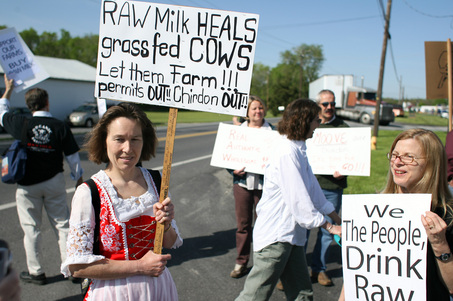A Kansas State colleague was telling us about his travels during the winter break, including a visit to a daughter-in-law who is seriously committed to providing her young children – and his grandchildren – with raw or unpasteurized goat’s milk.
I said we’d update the table of outbreaks and he could provide it, as information, without the lectures, to his daughter, and possibly leverage the .jpg) future health of his grandchildren, although that kind of discussion wouldn’t go very far (even though several of the outbreaks involve raw goat’s milk).
future health of his grandchildren, although that kind of discussion wouldn’t go very far (even though several of the outbreaks involve raw goat’s milk).
Columnist Stephen Hume of the Vancouver Sun writes today that he doesn’t believe claims that pasteurizing milk destroys its nutritional value or that it’s a conspiracy of big agribusiness and big government to promote the interests of big pharma.
I see pasteurization of dairy products as a blessing. It prevents our return to a dreadful past in which diseases transmitted by raw milk afflicted hundreds of thousands every year. In fact, they still do in many parts of the world where people can’t get pasteurized dairy products. …
Raw milk advocates who trumpet the health benefits of unpasteurized products are in fact the beneficiaries of precisely the public health “conspiracy” to pasteurize that so many deride and vilify.
I’m all for personal choice, and there are lots of risky foods out there. Choice is the reason raw milk farmer Alice Jongerden in British Columbia can risk public health, waste tremendous public health resources that could be  better used elsewhere, and take up time in the Supreme Court of B.C. by asking judges to set aside a 2010 court order that prohibits her from producing and packaging unpasteurized dairy products.
better used elsewhere, and take up time in the Supreme Court of B.C. by asking judges to set aside a 2010 court order that prohibits her from producing and packaging unpasteurized dairy products.
I choose not to consume raw dairy because the pasteurized alternatives offer an easy disease control option, and I try not to inflict food poisoning risks on my children, who don’t have much of a choice.
An updated list of outbreaks related to raw and unpasteurized milk and products is available at:

.jpg) Sorenne — anyone who has to say, ‘trust me’ is immediately untrustworthy.
Sorenne — anyone who has to say, ‘trust me’ is immediately untrustworthy.